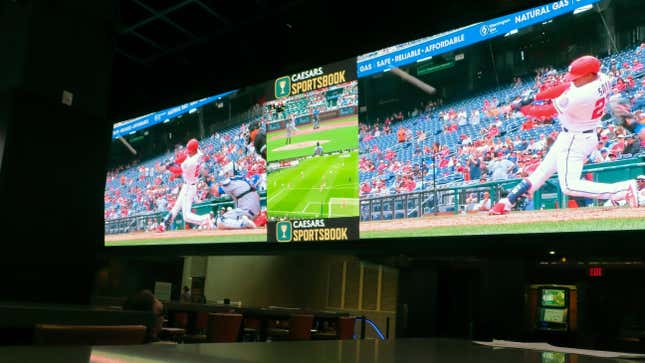
After the initial head-first dive into the markets, sports betting operators and states have come to an in-between space where unmitigated enthusiasm has consequences.
Take recent headlines, where Alabama coach Brian Bohannon was fired, numerous college players in Iowa are being investigated for sports betting, or in the NFL, where five players have been suspended for betting, or even in the MLS, where Max Alves is being investigated for allegedly receiving a yellow card in exchange for $12,000.
That was the backdrop when the SBC Summit was held at the Meadowlands Exposition Center last week in Secaucus, N.J. last week. The summit is the definitive gathering for those looking to get into sports betting as operators, or to provide stats, data, marketing, and thought leadership. It’s two days of panels and informal agendas; day drinking optional.
Sports Betting Conference grows up
The conference has grown up this year. In 2019, when sports betting was new and New Jersey was celebrating its sizeable role in overturning PASPA, there was an acreage of sports bars, booze, and big screens stretching across the showroom floor. Sports betting was going to be big fun. Seeing this space in 2023, with subdued brands and conversational spaces, sports betting has grown up. It’s not that the taps have been removed, but everything has been toned down and more polished.
Because after the optimistic party of the early days, it’s clear that sports betting isn’t simply entertainment. Mid-American Conference commissioner Jon Steinbrecher iterated this when he discussed the consequences to college players, which included harassment and threats after losing a game on a magnitude of order more intense than in earlier eras.
“We need to make sure we’re informing and educating all our folks,” Steinbrecher said, “what are the pathways for dealing with this?”
Big fun is now serious business, but no one is shocked that gambling is going on in that establishment, casino, court, or locker room.
LSU, Caesars met with criticism after partnership
While sports betting has been legal for decades abroad, countries in Europe don’t have the sticky issue of college sports. Some gambling operators have partnered with colleges, such as LSU’s deal with Caesars, but there is the issue of directing gambling advertisements to under-aged students if you advertise on a college campus. After an email went out to all LSU students offering an incentive to gamble, both parties were criticized. Like drinking alcohol, sports betting is only legal for those aged 21 and older.
At SBC, one panel, in particular, addressed a real problem with targeting this demographic. Dan Trolaro, the VP of Prevention at EPIC Risk Management, noted that young college-aged men were more likely to engage in risky behaviors, and the same characteristics that might make someone good at sports, competitiveness, discipline, and goal-oriented focus, might draw them to addictive behavior as well.
“Some sports have more risk of addiction and infiltration from bad actors than others,” Trolero said. He later added, “We do a great job of educating about substance use disorders, vaping, cannabis…we need to start including gambling.”
As if Name, Image, and Likeness rules weren’t giving athletic departments enough to wrestle with.
But the downsides of sports betting were just a small part of this two-day panel conference.
The SBC Summit is a place where you can get afternoon donuts and morning beer, where the regulators are in suits and ties to be easily distinguished from the salesmen wearing dress casual and tan shoes.
And there was a lot of bullishness on the industry in other ways. With Draft Kings and FanDuel both getting into platforming content, one panel addressed the need to meet the casual fan and serve the hardcore fan. The difference between a traditional newspaper sports section and the Daily Racing Form.
“The reason that Amazon and Apple and telecoms are getting into sports is because sports is an ecosystem,” said Amir Gelman, GM and head of business for WSC Sports.
There are going to be more telecasts where the analysts are talking about the game through the prism of odds, in-game betting opportunities, and microbets. Think of it like the ManningCast, but directed at your wallet. A sample of the words being thrown up on these panels: optics, enhancements, value exchange, and barrage, but as a verb.
“The fact is that sports is the fuel that drives the media industry,” said iHeartMedia sports president Kevin LeGrett. “The challenge is that we as broadcasters have to convert that into revenue streams.”
And leagues have that issue as well. Take NASCAR, where Joseph Solosky is managing director of sports betting. He said that 80 percent of the bets on that sport are based on the winner. And in sports betting, that’s a limited option. His challenge is to get NASCAR’s platform partners to find bets that are the equivalent of the coin flip at the Super Bowl.
Meanwhile at the NBA, SVP of global media distribution and business affairs David Denenberg noted the success of the “first to 15” strategy, a simple wager that an NBA bettor can make in addition to the outcome of the game. Denenberg said it was about, “good content that’s not overbearing.”
They’ll be back next year with the new best tech, data, and shiny objects. Back for the donuts, panels, side meetings, and synergies. Because no matter the risks, sports betting is just getting started.